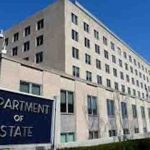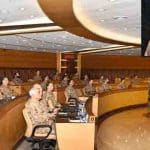UNITED NATIONS, May 02 (APP): An international meeting of special envoys on Afghanistan ended in Doha, Qatar, Tuesday, with UN Secretary-General Antonio Guterres saying they had agreed on the need for a “strategy of engagement” with the Taliban to help the country’s most vulnerable people.
No statement was issued after the closed-door meeting, which was convened by the UN chief, who said that another meeting will take place in the future.
The Taliban were not invited to the meeting, which was attended among others by Pakistan’s Minister of State for Foreign Affairs, Hina Rabbani Khar.
Speaking to newsmen in Doha, the secretary-general made clear that the gathering had not focussed on recognition of the de facto authorities, but rather on developing a common, international approach to burning interlinked issues, such as terrorism, the crackdown on human rights, and the spread of drug trafficking.
“To achieve our objectives, we cannot disengage”, the UN chief said.
“Many called for engagement to be more effective and based on lessons which we have learned from the past. The UN will continue to use its convening power to advance a forward-leaning approach, which puts the Afghan people first, and in a manner that is complementary to existing regional platforms and initiatives.”
UN Deputy Secretary-General, Amina Mohammed, had suggested last week that the meeting in Doha “could find those baby steps to put us back on the pathway to recognition.”
Afghan activists had voiced opposition to any recognition of the Taliban government,
The Taliban seized power in August 2021 as U.S.-led forces withdrew following 20 years of war.
In December, the 193-member U.N. General Assembly approved postponing, for the second time, a decision on whether to recognize the Afghan Taliban administration by allowing them to send a United Nations ambassador to New York.
Asked by a reporter if there would be any circumstance under which he’d be willing to directly meet with the Taliban, Guterres said: “When it is the right moment to do so, I will obviously not refuse that possibility — but today is not the right moment to do so.”
The UN chief said the current ban introduced last month by Taliban leaders on Afghan women working for the UN – following on from a ban on them working for national and international NGOs “is unacceptable and puts lives in jeopardy.
“Let me be crystal clear: we will never be silent in the face of unprecedented, systemic attacks on women and girls’ rights. We will always speak out when millions of women and girls are being silenced and erased from sight.”
Guterres said the envoys had agreed it was important to “understand each other’s concerns and limitations, but agreed that it was in everyone’s interest, foremost the Afghans, to work together.”
They reached agreement on “the need for a strategy of engagement that allows for the stabilization of Afghanistan but also allows for addressing important concerns.”
While different countries placed different priorities on human rights, terrorism, or drug trafficking, “there is a general recognition that they are intertwined”, and needed to viewed as a whole.
He concluded speaking in his own capacity as Secretary-General, stating it was “difficult to overestimate the gravity of the situation in Afghanistan. It is the largest humanitarian crisis in the world today.”
A staggering 97 per cent live in poverty, while 28 million Afghans, need some form of humanitarian assistance.
Funding is not forthcoming, with the Humanitarian Response Plan, seeking $4.6 billion, having received “a mere $294 million” so far.
The vast majority of the UN personnel delivering lifesaving aid, are Afghan nationals, he stressed and banning women workers “deliberately undermines the development of a country that desperately needs the contributions of all, in order to achieve sustainable peace and contribute to regional stability.”
Guterres pledged the UN would never waver in its commitment to support the Afghan people, and the Organization is determined to keep on delivering to preserve the fragile lifeline
“Throughout the past decades, we stayed, and we delivered. And we are determined to seek the necessary conditions to keep delivering.”
Follow the PNI Facebook page for the latest news and updates.









